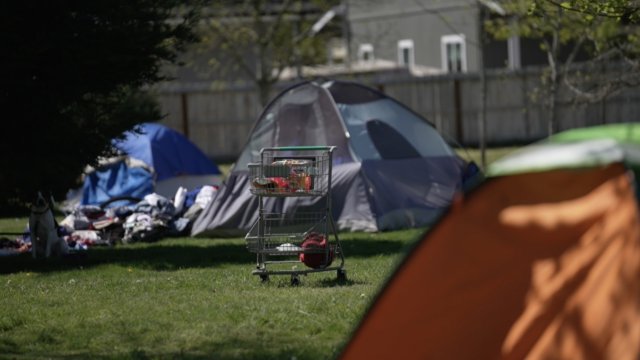It's a case that started in a public park in southern Oregon, and now it's going in front of the U.S. Supreme Court. The decision the justices make could impact how homelessness is handled across the country — including whether to give law enforcement the ability to cite or arrest people for sleeping on public property.
Every Thursday morning, Cassy Leach and her fellow volunteers, many of them health care workers, drive food, clothes and supplies between different parks in the southern Oregon town of Grants Pass, a 50-minute drive north of the California border.
"We follow up with people individually and do case management services and meet them where they're at to provide resources," she said.
The goal: use food and conversation to build trust with unhoused people that will lead them to accept services like health care, addiction treatment and housing.
Leach explained what motivated her: "These people live a mile from me and the fact that they don't have running water, where they're camped at. The bathrooms are closed down. Being able to take care of a wound is darn near impossible with no water."
Brian Simmons is a real estate agent who's lived in Grants Pass for the last 30 years. Over the last few years, potential clients have been asking more and more about the town's unsheltered population who have taken refuge in cars and tents, spread throughout 20 public parks.
"I don't know if there was any real point where it all of a sudden became an issue. It seems like it was just a very slow evolution to get to where we're at today," he said. "That's one of the more common questions I get is like, 'Hey, how is the homeless population really? Is it, is it really that big of a problem?'"
Now in the town of 40,000 people, the homelessness crisis is the focus of a Supreme Court case — Grants Pass v. Johnson. In it, the unhoused plaintiff says the way the city treated homeless people in its parks was unconstitutional. Arguments in the Supreme Court are scheduled for Monday, and depending on the outcome, law enforcement across the country could be allowed to use the law to punish unhoused people for sleeping on public lands.
That's something that the Oregon Law Center, which represents the plaintiff, says could make the homeless crisis in America more dire.
"Do we want to live in communities where we all help each other to try to find a safe place to live? Or do we want to live in a community where we punish and arrest and jail the victims of our failed housing policies because they have nowhere else to go?" said Ed Johnson, the director of litigation at the Oregon Law Center which is representing the homeless.
Currently, the 2018 9th Circuit Court decision Martin v. Boise found that while camping on public property can be made illegal, citing or arresting people for sleeping on public property equates to cruel and unusual punishment if they have nowhere else to go.
Leaders from both sides of the political spectrum say this decision has taken a crucial tool away from municipalities where homelessness issues are increasing faster than resources can handle.
Aaron Hisel, a former police officer, is now an attorney representing the city.
"Some of the most rewarding days as a cop were the times where somebody came back to the station a year later and said, 'I just wanted you to know I've been clean since the day you arrested me. You saved my life.' And we're removing those levers from the system," he said.
Shayna Mueller, 35, lives with her dog in a tent in Grants Pass, bouncing between public parks. On the day we spoke, she was told by police to move within 72 hours to another park. This happens twice a week.
"We have nowhere else to go. We are here because we have to be here," she said.
Grants Pass does have a privately run shelter, but it has limited beds, doesn't allow dogs and requires daily attendance at religious services.
Mueller says, "I want to have a job. I want to have things just like everybody else. But it's just so hard and expensive and everything."
SEE MORE: DC charity helps those who are homeless get housing
Trending stories at Scrippsnews.com




